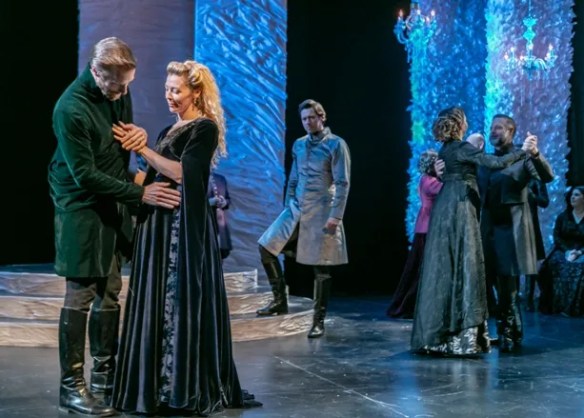
Solid appreciation is needed for the decision by Two River Theater in Red Bank, New Jersey, and its new artistic director, Justin Waldman, to present a radical reimagining of Shakespeare’s Romeo and Juliet, running through April 30. Contemporary playwright Hansol Jung has transformed not only the work, but the theater itself. Jung and Dustin Wills direct the production, presented in partnership with the National Asian American Theatre Company.
On one hand, like any project making massive changes to a beloved classic, some aspects will be more successful than others. On the other, this play is so familiar that the creative deviations are immediately recognizable. The circular platform that serves as the stage allows some audience members to sit behind it and on the sides. While it isn’t quite theater-in-the-round, it’s a good way there. Members of the cast engage with some audience members before the show, and occasionally even during it. At one point, Romeo (played by Major Curda) walks up an aisle for the balcony scene. At the performance I attended, he sat down next to an audience member and gave his line, “What light through yonder window breaks?” and the audience member replied, “I have no idea.”
That actually sums up parts of the experience for a number of audience-members. It’s as if we were watching two plays. The thread of the original goes throughout, and substantial sections of Act II are presented fairly conventionally. On those theatrical bones, Jung has constructed a farce—antic behavior, dashing about, plain silliness, and some truly comical moments. Music is brought in nicely. In the early scenes, during Romeo’s mopey period, he plays a guitar and sings woefully. Other characters occasionally sing too. Various instruments make themselves heard from time to time. Near the end, Jung included spoken and sung allusions to Prince’s “Purple Rain,” with its references to perfect, unattainable love.
The staging was done with an eye to engaging audiences on all sides, but that creates a few complications. Since the actors are unmiked, at times they are speaking with their backs to part of the audience. While the speeches by Capulet (Brian Lee Huynh) were always clear, I had trouble understanding the fast-talking Juliet (Dorcas Leung). In the last act when all the baskets and boxes from around the edge of the platform are put up onto it, friends sitting lower down said their sight lines were blocked.
The energetic cast gleefully shook the cobwebs off the audience’s preconceptions about their roles. In addition to those mentioned are Purva Bedi (Friar Lawrence), Jose Gamo (Mercutio), Zion Jang (Benvolio), Mia Katigbak (Nurse), Rob Kellogg (Paris/Tybalt), and the notable Daniel Liu (Peter/Lady Capulet). His scene trying to gently persuade Capulet not to banish the willful Juliet was heartbreaking and truly memorable.













